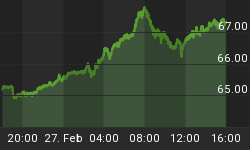Fed Brings Uncertainty

Just two short days ago the Fed told us the economic data did not justify tapering their monthly bond purchases. The stock market jumped higher. Less than 48 hours later, MarketWatch reported:
The Federal Reserve could begin to slow asset purchases at its October meeting depending on economic data, said St. Louis Fed President James Bullard Friday on Bloomberg Television. "October is a live meeting," he said. "This was a close decision here in September, so it's possible you get some data that change the complexion of outlook and make the committee be comfortable with a small taper in October."
No Taper Should Be Good For Treasuries
The nuts and bolts that make up a program of quantitative easing (QE) require the Fed to buy bonds, including U.S. Treasuries. The Fed has deep pockets and can create a good bit of demand for bonds. Therefore, the decision to hold off on tapering should be good for bond prices. The question now becomes are bonds (TLT) better than stocks? On a longer-term time horizon, the answer is not yet.

A Bet On Future Economic Outcomes

When investors buy an asset, they believe it will become more valuable over time. Relative demand allows us to better understand what sectors, asset classes, or areas of the globe are rising to the top of investors' "I am confident about this" list. If the demand for stocks is greater than the demand for bonds, it tells us something about the aggregate fundamental belief investors hold about the future.
What are investors confident about now?
Our market model is highly dependent on weekly supply and demand outcomes since they filter out much of the day-to-day noise. The table below summarizes some of the current readings of how market participants view the investment landscape. Confidence is growing in the relative benefits of foreign and emerging market (EEM) stocks. As shown below, EEM is outperforming the S&P 500 by 2.49% this week (as of Thursday's close). Leadership from emerging markets, small-caps, and mid-caps aligns with confidence in future economic outcomes, and is bullish.

Defensive Assets Are Lagging
If investors were fearful of future economic outcomes or concerned about a plunge in stock prices, we would expect to see demand pick up for conservative assets relative to stocks. The table below shows just the opposite as of Thursday's close. Conservative Treasuries (TLT) are lagging the S&P 500 by 1.22% this week. A broad basket of bonds (AGG) is lagging by 0.99%. Healthcare stocks are lagging by 0.77%.

Jobs vs. Inflation
During a speaking engagement Friday, James Bullard took a firm stance on nothing. From MarketWatch:
St. Louis Fed President James Bullard said on Friday that ongoing improvement in labor-market data relative to last September will increase the probability of tapering the Federal Reserve's bond-buying program. But he also noted that given low inflation, the Fed can afford to be patient in assessing its asset purchases.
Investment Implications - Need To See Shift
Investors often miss opportunities to profit (case A) or remain in losing positions (case B) because they believe something will change. The self talk goes something like this:
Case A: I can't buy stocks now; they are ready to reverse.
Case B: I can't sell my bonds now; they have lost so much this year.


Focus On What Is, Not What May Be
It is much easier to make money if we assume something that is already happening will continue to occur, rather than fearing or hoping something that is not happening will begin to happen. The tables above show us that "risk-on" assets, such as foreign stocks, are leading. They also show us that "risk-off" assets are lagging. The last two sentences tell us what is happening, which means we will continue to favor stocks over bonds. We will also hold our positions in small caps (IWM), foreign stocks (EFA), and emerging markets (EEM).


One Day Does Not Make A New Trend
When the evidence changes and begins to signal a shift toward conservative or risk-off assets, we will make adjustments in line with the magnitude of the shift. How meaningful were the losses as of midday Friday? From a weekly trend perspective, not that meaningful. The chart below shows the demand for being long stocks vs. the demand to "go short". Friday's losses have had very little impact on the bigger weekly picture. In fact, at 1:00 PM EDT Friday, a short investor (SH) was lagging the S&P 500 by 3.24% this week. Change may come, but we need to see evidence of a meaningful shift in the market's risk appetite. We will remain flexible and open minded.
















